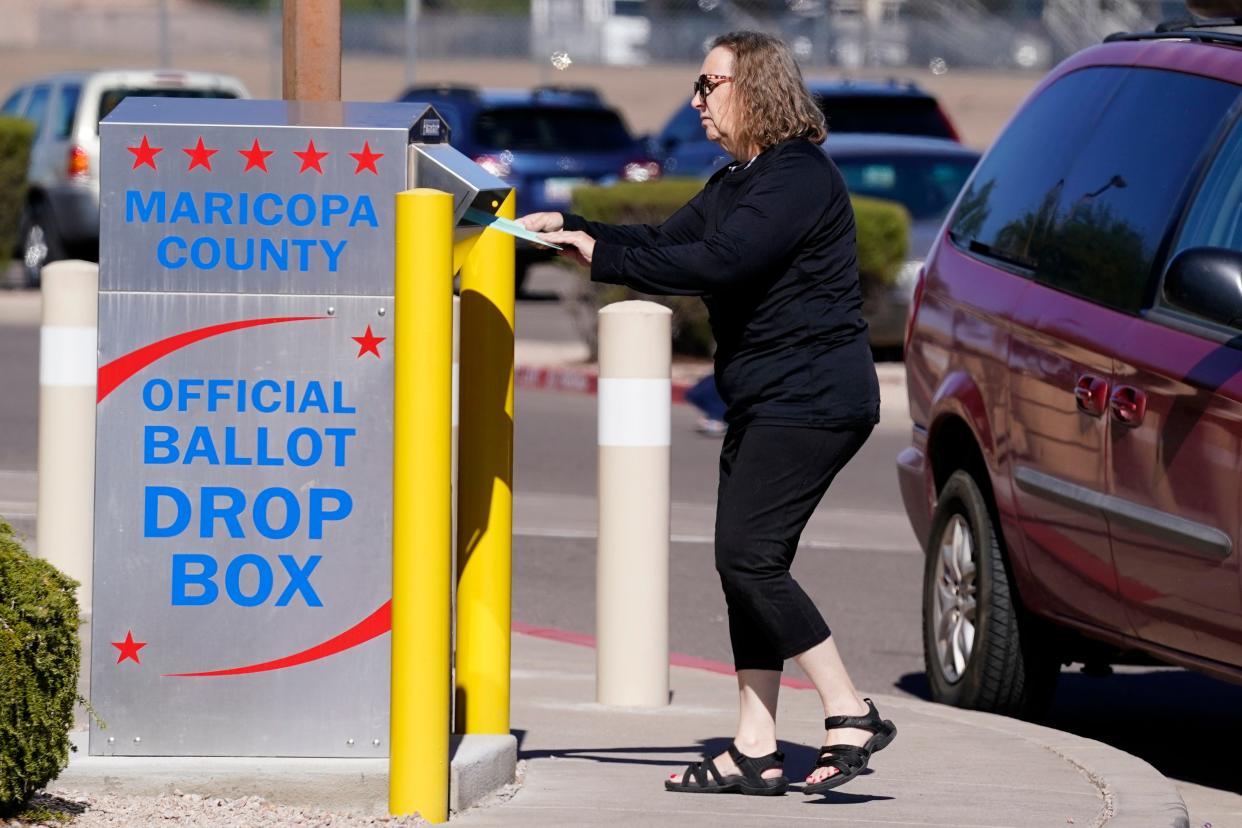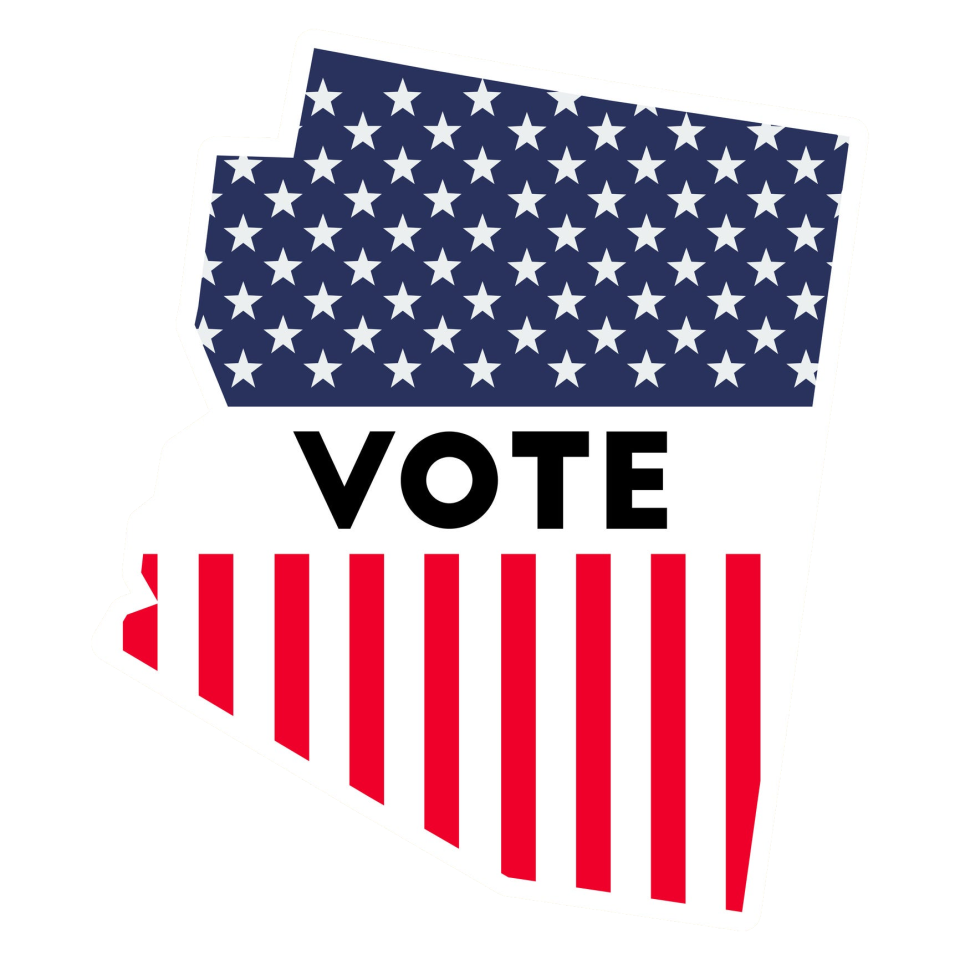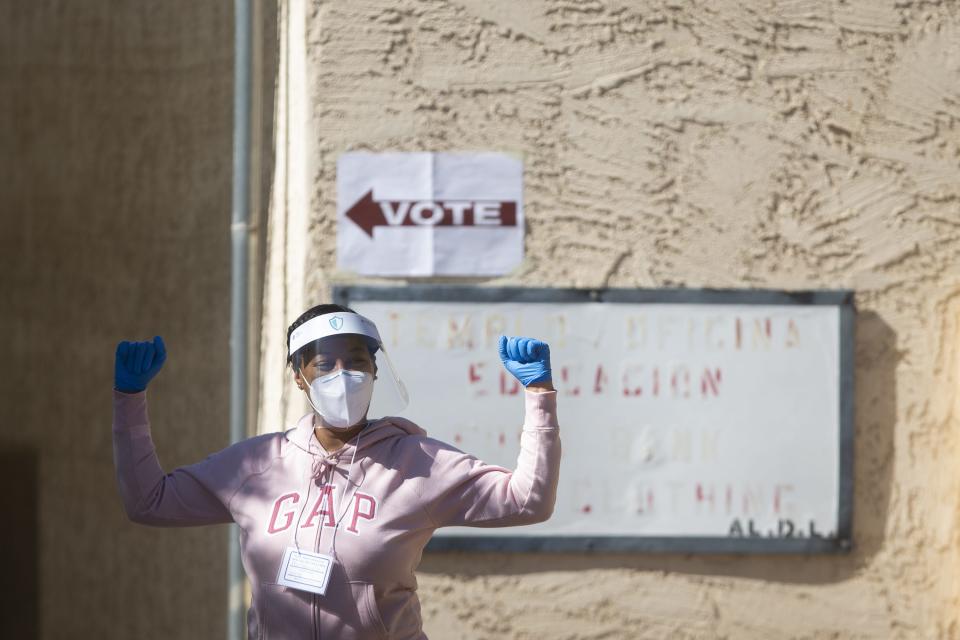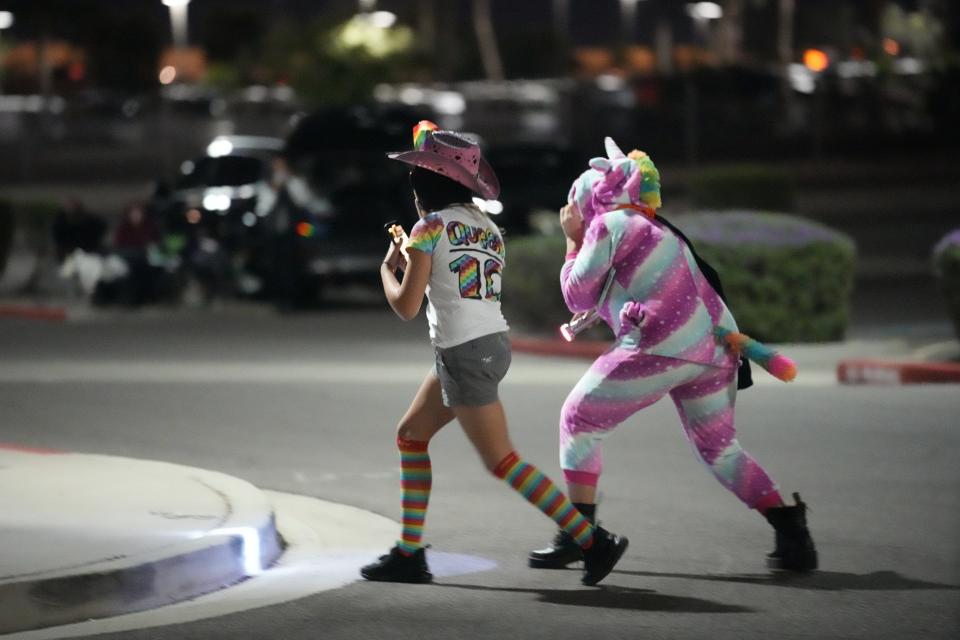Voters' rights in Arizona: A look at changing laws, court challenges and access

Early voting is underway in Arizona, although not without ripple effects from unproven election fraud conspiracies.
At least two right-wing groups organized people to observe as voters dropped off their early ballots. One voter filed a complaint that said "camo clad" people took photos of the vehicle license plate as the person dropped off a ballot outside Maricopa County's main election center in Phoenix.
The Arizona Republic talked with drop box monitors seated in lawn chairs with an orange pizza box beside them. While it may have looked like a backyard barbecue, they were photographing voters and staffers at the county's election headquarters.
A judge has since placed limits on one group of monitors, and the other group bowed out.
More than a million ballots for the Nov. 8 election already have been cast in Arizona, which was an early adopter of voting by mail. State lawmakers created the system in 1991 with bipartisan support. Three decades later, that's how the vast majority of Arizonans cast ballots.
Fast-growing Arizona shifted from a reliably red state to choosing Democratic President Joe Biden by a narrow margin in 2020. That sparked months of lawsuits and a review of Phoenix area ballots by state Senate GOP leaders and allies of former President Donald Trump.
Democracy in doubt: White House phone calls, baseless fraud charges. The origins of the Arizona election review
Those efforts turned up no evidence of widespread fraud, but claims of a stolen election have been a rallying cry for some of the top GOP contenders in primary and general election campaigns, including Blake Masters running for U.S. Senate, Kari Lake vying for governor, Mark Finchem vying for secretary of state and Abe Hamadeh running for state attorney general.
Arizona's election system has survived multiple legal challenges, although some appeals continue. Lake and Finchem sued to end the use of ballot-counting machines, but a federal judge tossed the case. They appealed the ruling. And the Republican Party of Arizona lost its lawsuit claiming the long practice of early voting violated the state's Constitution. That case now sits with the state Court of Appeals.
Changing Arizona election laws
Lawmakers have changed some of the state's election laws in recent years, and voters on Nov. 8 will decide on a ballot measure that would tighten voter ID requirements. Here's a look at those changes and how voting works in Arizona.
Six years ago, Arizona lawmakers made it a felony for anyone other than a family member, household member or caregiver to return a voter's early ballot. Supporters sought to ease concerns over so called "ballot harvesting," while critics said the law disproportionately impacted minority communities and those living in rural areas.
The U.S. Supreme Court in 2021 upheld the state law passed in 2016. The ruling also upheld a state law that disqualifies ballots cast in the wrong precinct.

Election guide: November 2022
City races | School boards | State | Governor
| Ballot measures | Federal races | How to vote
A flurry of election-related proposals were introduced in this year's legislative session, although only a fraction became law and mostly made moderate changes. And one proposal will go before Arizona voters this month.
Voters will decide whether to tighten ID laws. Arizona already verifies signatures of those who vote by mail and requires voters at the polls to present a photo ID or two items that show the name and address of the voter. But Proposition 309 would require early voters to write their birthdate and government ID number, in addition to their signature, on an early ballot affidavit.
As for in-person voters, currently those without a photo ID can provide two items that show their name and address, such as utility bills. That would go away. Also, if the address on the voter's photo ID didn't match the voter rolls, then two items such as utility bills would be required. The Arizona Department of Transportation would have to issue IDs for voting purposes for free.
More recounts likely. Arizona lawmakers this year passed a bill that widened the margin that would trigger an automatic recount of votes to 0.5% from 0.1%. It was a reaction to Biden's narrow win over Trump in 2020 but could have an impact on races this year.
Further scrutiny of voter registration. State lawmakers this year passed a law that requires county election officials to attempt to confirm any information they receive that a voter registration isn't valid. The law is slated to take effect in the new year after a judge halted implementation too close to the start of this year's voting.
Proof of citizenship. Arizona law already requires proof of citizenship to vote in state elections, but a law passed this year extends the requirement to federal-only voters. If they do not show documentary proof of citizenship, they will not be eligible to vote in presidential races or vote by mail. That law takes effect next year.
Tightening who gets an early ballot. Gov. Doug Ducey signed legislation in 2021 to remove voters who signed up to receive a ballot in the mail automatically ahead of each election if they haven't voted early at least once during two election cycles.

Voting in Arizona
The deadline for Arizonans to register to vote was Oct. 11, and early voting began a day later.
A voter must opt into the early voting, but once on the early list they automatically receive early ballots each election cycle as long as they remain an active voter.
Voters can cast their ballots by mail, drop box or in person in the weeks leading up to the election and on Election Day. The recommended deadline to get it in the mail was Nov. 1 to ensure election officials have it in hand on Election Day.
In Maricopa County — Arizona's most populous county and the fourth-largest in the U.S. — voters don't go to specific polling places. Rather, a voter can choose the most convenient voting center across sprawling metro Phoenix. More than 200 voting centers will be open on Election Day.
Arizonans voting in person must show ID. Acceptable forms of ID include a valid Arizona driver's license, tribal enrollment card or other government-issued identification. Voters also may show two forms of non-photo identification bearing their name and address.
Voters who mail in their ballot must sign the envelope. That signature is then cross-referenced with several signatures election officials have on file for you.
How a ballot is made: Inside Phoenix company that serves voters in 23 states

Ensuring voters feel secure
Some voters dropping off early ballots at outside locations in downtown Phoenix and Mesa began complaining in October that groups of people were filming them and taking photos of their license plates. Some of the observers touted the debunked film "2,000 Mules," which states without proof that widespread ballot harvesting occurred during the 2020 presidential election.
The situation prompted Maricopa County Sheriff Paul Penzone to warn that his deputies will “babysit” ballot drop-off sites to help voters feel secure and “protect democracy.”
It also prompted voter rights groups to file lawsuits in federal court, arguing the stakeouts crossed the line into voter intimidation. Attorneys with the U.S. Department of Justice weighed in with a court filing that clarifies it "expresses no view on any factual dispute before the Court," but details when ballot monitoring could constitute voter intimidation.
“Although lawful poll-watching activities can support democratic transparency and accountability, when private citizens form 'ballot security forces' and attempt to take over the State’s legitimate role of overseeing and policing elections, the risk of voter intimidation — and violating federal law — is significant,” the filing read.
Voter guide: Where to drop off your Arizona ballot and how to track it
The judge declined to fully ban the ballot box monitors with Clean Elections USA, a group founded by an Oklahoma woman, but he did place limits on them. Among the limits are that the group can't:
Take photos of voters who are within 75 feet of a ballot box.
Post identifying images or information about voters online.
Make false statements about election law from now to the end of the voting period.
Openly wear body armor or carry guns within 250 feet of a drop box, although they will not be in breach of the order if body armor or weapons are concealed.
In this climate, the Carter Center helped form the Arizona Democracy Resilience Network. It’s billed as a cross-partisan effort asking political candidates to:
Cooperate with elections officials.
Avoid spreading falsehoods.
Acknowledge the legitimacy of election outcomes after results have been certified.
The center's efforts to bolster democracy have historically been focused outside of the U.S., but it announced in 2020 that it would begin to look inward.
“When you have candidates talking about fraud when there's really been no evidence of fraud and fraud before an election is even held, it presents the kind of atmosphere out there that can lead to things down the road that you just don't want to see happen," said Network co-director Don Henninger of Scottsdale, a former media executive.
The Republic's Mary Jo Pitzl and Ryan Randazzo contributed to this article.
Sasha Hupka covers Maricopa County and regional issues for The Arizona Republic with a focus on voting and democracy. Do you have a tip about elections or questions about voting? Reach her at sasha.hupka@arizonarepublic.com. Follow her on Twitter: @SashaHupka.
This article originally appeared on Arizona Republic: Voters' rights in Arizona: Changing laws, court challenges and access

